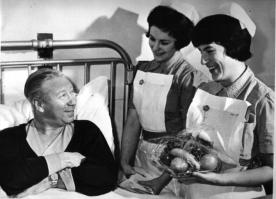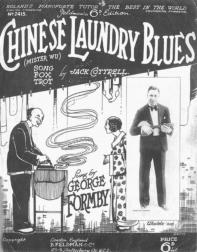



A superstar for four decades
FORTY YEAR CAREER
The show business career of George Formby spanned exactly FORTY YEARS, beginning in 1921 until his death in 1961. During that period he appeared in 21 hit films, cut over 230 records, made hundreds of stage performances, appeared in two Royal Command Performances and entertained an estimated THREE MILLION Allied Servicemen and women during World War II throughout Europe and the Middle East. Although he never performed in the U.S.A. he did make personal appearances and was very popular in Canada, Australia, New Zealand and South Africa.HIGHEST PAID ENTERTAINER
By 1939, George Formby was the most popular and highest paid entertainer in the British Isles and was estimated to be earning over £100,000 a year. The secret of his success was a unique combination of personality, natural ability and talent, coupled with the driving force of his wife, Beryl as his Manager. With his natural human warmth and friendliness, George could hold a live audience in the palm of his hand as he sang and played the ukulele-banjo in his own inimitable style. He seemed to have the ability to make people enjoy what he did, and his audiences always called for more. George Formby is credited as co-writer on many of the songs that he recorded but is input was probably quite small. Songwriters in many cases would be happy to allow George this privilege as they knew that if George recording their songs, a hit was usually guaranteed! He made the banjo-uke his own, perfecting various syncopated strokes that many players still find difficult to achieve today. BORN IN WIGAN IN 1904 The story behind George's rise to popularity in show business is an interesting and fascinating one. He was born George Hoy Booth on 26 May 1904 in Wigan, Lancashire. He was the eldest of seven children having four sisters and two brothers. His father, George Formby Senior (real name James Booth), was already a famous comedian on the UK’s music halls when young George was born.APPRENTICE JOCKEY
George Formby Senior never wanted any of his family to enter show business and so young George was sent to become an apprentice jockey at the age of seven years. He rode his first professional race at the age of ten and weighing only three stones thirteen pounds. When his father died suddenly in 1921, encouraged by his mother and being too heavy to continue horse racing, he decided to follow in his father's footsteps.BERYL
In 1922 whilst playing a date in Castleford, George met a young dancer on the same theatre bill named Beryl Ingham. Beryl was appearing in a dancing act with her sister May. George fell in love with Beryl and they married in 1924. It is to Beryl that we must thank for the emergence of George Formby as one of Britain’s greatest entertainers. She managed his career and his life, dressed him in smart clothes and together they made a fortune from their joint efforts.GEORGE’S STAGE DEBUT
Calling himself George Hoy (his mother's maiden name) he took to the stage using his father's material. Father had many contacts in the show business world and was very well thought of by all, so George was given bookings at small theatres but probably initially struggled. After a couple of years learning the business, he met a fellow actor who strummed a Banjo Ukulele for fun between shows. He sold the instrument to George for two pounds ten shillings and George quickly learned a couple of songs. Accepting a bet that he dare not use the Banjo Ukulele in his act, George played it at the Alhambra Theatre in Barnsley - and brought the house down! George and his 'Uke' were inseparable from that point on.CHINESE LAUNDRY BLUES
In 1932, George made a record with the famous Jack Hylton Band. The 'A' side was called 'Do De O Do' and the 'B' side was a song called 'Chinese Blues'. When the record was released it was the 'B' side that became all the rage across the North and the Midlands and Formby adopted it as his signature tune renamed as 'Chinese Laundry Blues', complete with the now famous 'Mr. Wu'.FILM CAREER BLOSSOMS
In 1934, George made his first film, 'Boots! Boots!', which launched his film career. A contract to make 11 films for ATP at the Ellstree Studios soon followed resulting in George Formby becoming the most popular entertainer in the British Isles earning an estimated £100,000 a year. A further contract with Columbia to make seven films earned him a further £500,000. Each of his films contained three or four songs which were invariably released as 78 rpm records and on sheet music. These included such titles as:- 'The Window Cleaner', 'Fanlight Fanny', 'Riding In The T.T. Races' and probably his most famous song, written by Noel Gay, 'Leaning On A Lamp Post'.SILVER DISC
In December 1937 Regal Zonophone presented George with what is thought to be the very first Silver Disc for achieving sales of 100,000 copies of “The Window Cleaner”. These days Silver and Gold Discs are commonplace in the recording industry but George is acknowledged as being the very first artist to receive one.WORLD WAR TWO AND ENSA
In 1939 World War II broke out and George supported ENSA (Entertainments National Service Association) throughout Europe and the Middle East and was one of the first entertainers into Normandy after the invasion, where he was personally invited by General Montgomery to entertain the front line troops. Initially George’s wife Beryl was discouraged from travelling with him to war fronts but Beryl insisted. Together they travelled and entertained over three million troops and when they were in the UK, they worked tirelessly to raise funds for many war charities.GEORGE IS HONOURED
In 1946, George was recognised in the King’s birthday honours list when he was awarded an O.B.E for his services to his country during the war years. Although delighted to receive the honour, George was disappointed that Beryl received nothing as of course she was the driving force behind all George’s achievements both through the war years and throughout George’s forty-year career.ZIP GOES A MILLION
After the war, George toured and entertained throughout the World. In 1951, he was offered the part of Percy Piggott in the musical show, 'Zip Goes A Million' by impresario Emile Littler. It was based on the play, 'Brewsters Millions'. When it opened in the West End it was acclaimed by the critics and George was a shining star again. However, six months into the run George suffered a heart attack, which caused him to leave the show and rest. After 18 months of recuperation, he began to do one-night stands, seaside summer shows and pantomime, gradually easing himself back into work.THE NORFOLK BROADS
Part of George Formby recovery from illness was spent on the Norfolk Broads where George and Beryl bought a house in Wroxam and they spent much of their time sailing on the Broads in their boats, Lady Beryl I and Lady Beryl II. George was able to combine this with appearing in Summer season in Great Yarmouth.LAST RECORDINGS AND THE FRIDAY SHOW
In 1960, George made his last record, 'Happy Go Lucky Me' and in December of the same year made what was to be his last television programme. A forty minute, one man show in a BBC series known as 'The Friday Show'. It was to be a confessional with George admitting that Beryl had been the driving force behind his success, that he couldn't read and write properly, that he didn't understand music and that he regretted not having any children. His wife, Beryl, watched the programme from her sickbed. She was dying from leukaemia, but was still able to offer her usual critique of George's performance. Beryl died on Christmas Eve, 1960. George was appearing in pantomime in Bristol and returned to the show immediately after the funeral.PAT HOWSON
There was still a few surprises to come. A few weeks after Beryl's death, George suddenly announced his engagement to Pat Howson, a young 36-year-old schoolteacher. George knew her through having purchased some motor cars from her father's garage. The wedding was planned for the early spring. Unfortunately George had another heart attack and although he appeared to be recovering, he died in Preston's St. Joseph's Roman Catholic hospital on the 6 March 1961 at the age of 56 years. He was buried in Warrington Cemetery in the family grave, and an estimated 100,000 mourners lined the streets on the day of the funeral to show their respect for one of the greatest entertainers this country has ever known.THE AUCTION
In George Formby’s will, most of his estate was left to his fiancée Pat. This caused great distress to the rest of the Formby family, so much so that they actually contested George’s last will. Owing to legal issues with the contested will, George Formby’s solicitor decided that a public auction would be held in a marquee within the grounds of the last Formby residence at Fairhaven near Blackpool. For three days, people were allowed to attended the auction and everything from George’s instruments, cars right down to personal clothing were up for auction! In a earlier will, George had left £5,000 to his mother and £2,000 to each of his sisters and Pat Howson offered to honour those conditions but the family refused. The appeal was fought until September 1965 when it was dismissed in Pat Howson’s favour.
Click on an image to enlarge




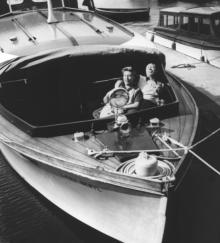




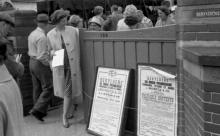
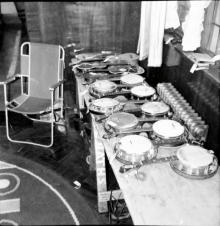
FORTY YEAR CAREER
The show business career of George Formby spanned exactly FORTY YEARS, beginning in 1921 until his death in 1961. During that period he appeared in 21 hit films, cut over 230 records, made hundreds of stage performances, appeared in two Royal Command Performances and entertained an estimated THREE MILLION Allied Servicemen and women during World War II throughout Europe and the Middle East. Although he never performed in the U.S.A. he did make personal appearances and was very popular in Canada, Australia, New Zealand and South Africa.HIGHEST PAID ENTERTAINER
By 1939, George Formby was the most popular and highest paid entertainer in the British Isles and was estimated to be earning over £100,000 a year. The secret of his success was a unique combination of personality, natural ability and talent, coupled with the driving force of his wife, Beryl as his Manager. With his natural human warmth and friendliness, George could hold a live audience in the palm of his hand as he sang and played the ukulele- banjo in his own inimitable style. He seemed to have the ability to make people enjoy what he did, and his audiences always called for more. George Formby is credited as co- writer on many of the songs that he recorded but is input was probably quite small. Songwriters in many cases would be happy to allow George this privilege as they knew that if George recording their songs, a hit was usually guaranteed! He made the banjo-uke his own, perfecting various syncopated strokes that many players still find difficult to achieve today. BORN IN WIGAN IN 1904 The story behind George's rise to popularity in show business is an interesting and fascinating one. He was born George Hoy Booth on 26 May 1904 in Wigan, Lancashire. He was the eldest of seven children having four sisters and two brothers. His father, George Formby Senior (real name James Booth), was already a famous comedian on the UK’s music halls when young George was born.APPRENTICE JOCKEY
George Formby Senior never wanted any of his family to enter show business and so young George was sent to become an apprentice jockey at the age of seven years. He rode his first professional race at the age of ten and weighing only three stones thirteen pounds. When his father died suddenly in 1921, encouraged by his mother and being too heavy to continue horse racing, he decided to follow in his father's footsteps.BERYL
In 1922 whilst playing a date in Castleford, George met a young dancer on the same theatre bill named Beryl Ingham. Beryl was appearing in a dancing act with her sister May. George fell in love with Beryl and they married in 1924. It is to Beryl that we must thank for the emergence of George Formby as one of Britain’s greatest entertainers. She managed his career and his life, dressed him in smart clothes and together they made a fortune from their joint efforts.GEORGE’S STAGE DEBUT
Calling himself George Hoy (his mother's maiden name) he took to the stage using his father's material. Father had many contacts in the show business world and was very well thought of by all, so George was given bookings at small theatres but probably initially struggled. After a couple of years learning the business, he met a fellow actor who strummed a Banjo Ukulele for fun between shows. He sold the instrument to George for two pounds ten shillings and George quickly learned a couple of songs. Accepting a bet that he dare not use the Banjo Ukulele in his act, George played it at the Alhambra Theatre in Barnsley - and brought the house down! George and his 'Uke' were inseparable from that point on.CHINESE LAUNDRY BLUES
In 1932, George made a record with the famous Jack Hylton Band. The 'A' side was called 'Do De O Do' and the 'B' side was a song called 'Chinese Blues'. When the record was released it was the 'B' side that became all the rage across the North and the Midlands and Formby adopted it as his signature tune renamed as 'Chinese Laundry Blues', complete with the now famous 'Mr. Wu'.FILM CAREER BLOSSOMS
In 1934, George made his first film, 'Boots! Boots!', which launched his film career. A contract to make 11 films for ATP at the Ellstree Studios soon followed resulting in George Formby becoming the most popular entertainer in the British Isles earning an estimated £100,000 a year. A further contract with Columbia to make seven films earned him a further £500,000. Each of his films contained three or four songs which were invariably released as 78 rpm records and on sheet music. These included such titles as:- 'The Window Cleaner', 'Fanlight Fanny', 'Riding In The T.T. Races' and probably his most famous song, written by Noel Gay, 'Leaning On A Lamp Post'.SILVER DISC
In December 1937 Regal Zonophone presented George with what is thought to be the very first Silver Disc for achieving sales of 100,000 copies of “The Window Cleaner”. These days Silver and Gold Discs are commonplace in the recording industry but George is acknowledged as being the very first artist to receive one.WORLD WAR TWO AND ENSA
In 1939 World War II broke out and George supported ENSA (Entertainments National Service Association) throughout Europe and the Middle East and was one of the first entertainers into Normandy after the invasion, where he was personally invited by General Montgomery to entertain the front line troops. Initially George’s wife Beryl was discouraged from travelling with him to war fronts but Beryl insisted. Together they travelled and entertained over three million troops and when they were in the UK, they worked tirelessly to raise funds for many war charities.GEORGE IS HONOURED
In 1946, George was recognised in the King’s birthday honours list when he was awarded an O.B.E for his services to his country during the war years. Although delighted to receive the honour, George was disappointed that Beryl received nothing as of course she was the driving force behind all George’s achievements both through the war years and throughout George’s forty-year career.ZIP GOES A MILLION
After the war, George toured and entertained throughout the World. In 1951, he was offered the part of Percy Piggott in the musical show, 'Zip Goes A Million' by impresario Emile Littler. It was based on the play, 'Brewsters Millions'. When it opened in the West End it was acclaimed by the critics and George was a shining star again. However, six months into the run George suffered a heart attack, which caused him to leave the show and rest. After 18 months of recuperation, he began to do one-night stands, seaside summer shows and pantomime, gradually easing himself back into work.THE NORFOLK BROADS
Part of George Formby recovery from illness was spent on the Norfolk Broads where George and Beryl bought a house in Wroxam and they spent much of their time sailing on the Broads in their boats, Lady Beryl I and Lady Beryl II. George was able to combine this with appearing in Summer season in Great Yarmouth.LAST RECORDINGS AND THE
FRIDAY SHOW
In 1960, George made his last record, 'Happy Go Lucky Me' and in December of the same year made what was to be his last television programme. A forty minute, one man show in a BBC series known as 'The Friday Show'. It was to be a confessional with George admitting that Beryl had been the driving force behind his success, that he couldn't read and write properly, that he didn't understand music and that he regretted not having any children. His wife, Beryl, watched the programme from her sickbed. She was dying from leukaemia, but was still able to offer her usual critique of George's performance. Beryl died on Christmas Eve, 1960. George was appearing in pantomime in Bristol and returned to the show immediately after the funeral.PAT HOWSON
There was still a few surprises to come. A few weeks after Beryl's death, George suddenly announced his engagement to Pat Howson, a young 36-year-old schoolteacher. George knew her through having purchased some motor cars from her father's garage. The wedding was planned for the early spring. Unfortunately George had another heart attack and although he appeared to be recovering, he died in Preston's St. Joseph's Roman Catholic hospital on the 6 March 1961 at the age of 56 years. He was buried in Warrington Cemetery in the family grave, and an estimated 100,000 mourners lined the streets on the day of the funeral to show their respect for one of the greatest entertainers this country has ever known.THE AUCTION
In George Formby’s will, most of his estate was left to his fiancée Pat. This caused great distress to the rest of the Formby family, so much so that they actually contested George’s last will. Owing to legal issues with the contested will, George Formby’s solicitor decided that a public auction would be held in a marquee within the grounds of the last Formby residence at Fairhaven near Blackpool. For three days, people were allowed to attended the auction and everything from George’s instruments, cars right down to personal clothing were up for auction! In a earlier will, George had left £5,000 to his mother and £2,000 to each of his sisters and Pat Howson offered to honour those conditions but the family refused. The appeal was fought until September 1965 when it was dismissed in Pat Howson’s favour.



A superstar for four decades
Click on an image to enlarge




